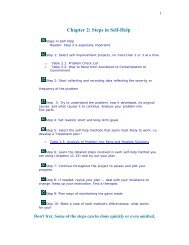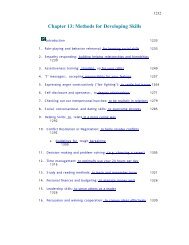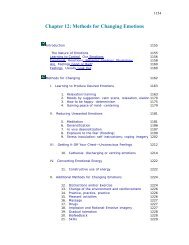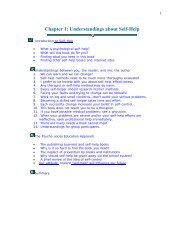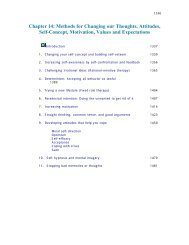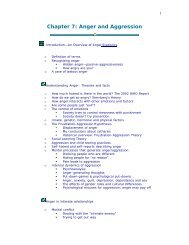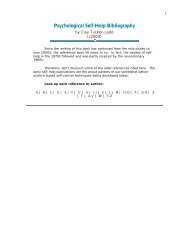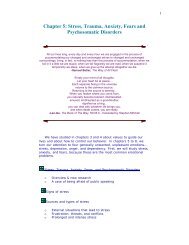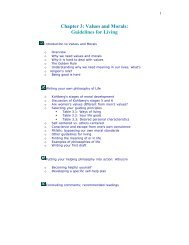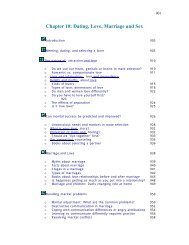Methods for Changing Behaviors - Psychological Self-Help
Methods for Changing Behaviors - Psychological Self-Help
Methods for Changing Behaviors - Psychological Self-Help
You also want an ePaper? Increase the reach of your titles
YUMPU automatically turns print PDFs into web optimized ePapers that Google loves.
Although researchers need to differentiate expectations (faith or<br />
confidence or placebo) from ability (knowledge or skill or motivation),<br />
in everyday life they are usually clumped together. Unrealistically high<br />
expectations can't last long. One way of feeling competent is to be<br />
competent. Learn the skills you need and practice, practice, practice.<br />
And let the confidence grow too. The self-efficacy will motivate you to<br />
try and persevere, whereas be<strong>for</strong>e you hesitated and gave up.<br />
STEP THREE: Try again with more self-confidence.<br />
The proof is in the pudding.<br />
Common problems with the method<br />
As implied above, if one lacks talent, a positive expectation is of<br />
little value if that talent is required. On the other hand, if one has the<br />
necessary skills, then self-confidence will encourage their use until<br />
success is achieved.<br />
Effectiveness, advantages and dangers<br />
Except <strong>for</strong> the well documented relationship between expectation<br />
and per<strong>for</strong>mance, there is very little knowledge, as yet, about how to<br />
change self-efficacy or about how powerful a factor it is. A problem is<br />
separating (1) the actual effectiveness of a self-help method from the<br />
impact of (2) simply having faith in an ineffective self-help method and<br />
(3) having faith that I, as a self-helper, have special aptitude in this<br />
area that will make me especially effective. (In medicine, the effect of<br />
the drug has to be separated from the patient's improvement based on<br />
believing an inert placebo pill will help.) Placebos in medicine are fairly<br />
effective. In self-help, probably all three factors are significant factors.<br />
If any simple method can increase the ef<strong>for</strong>t we will exert, it is<br />
valuable. There are no dangers.<br />
Additional reading<br />
Bandura, A. (1977). <strong>Self</strong>-efficacy: toward a unifying theory of<br />
behavioral change. <strong>Psychological</strong> Review, 84, 191-215.<br />
Increase intrinsic satisfaction in the activity<br />
There are many important activities that could be pleasurable but<br />
aren't: school, much of our work, child care, caring <strong>for</strong> others, etc. We<br />
are born curious and excited about learning. We want to be and feel<br />
competent. Yet, we get bored with school. Why? We have jobs that<br />
provide a great service to others (making a shirt or car). Yet, we may<br />
hate the work. Why? We like to give to others. Yet, paying taxes to<br />
provide schools, medical care, help to the old, the poor, the<br />
1119



